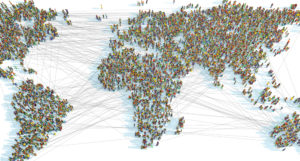Climate and migration crises & higher education policy
Examining the global policies influencing refugee access to higher education both in Canada and internationally, including the intersections of global migration and climate crises in higher education policy.
Research Projects
Canadian HE in global migration & climate crisis (2023)

We investigate the engagements of Canadian universities with intersections of global migration and climate crises through their policies. Though higher education institutions have been responding to global migration and climate crises, these responses are often not led by planned and connected strategies. Given that the intersections of these crises involve solutions that go beyond single responses to particular events, the purpose of this project is to examine the extent to which higher education policy considers the connection between migration and climate crises. Specifically, this project seeks to investigate how 15 Canadian research-intensive universities (U15) engage with intersections of global migration and climate crises. In this study, we conduct an analysis of publicly available policy documents from each of the 15 universities. Our search involved documents that focused on sustainability, climate, internationalization, and/or refugee students, such as strategic and action plans.
Who’s involved: Melody Viczko (PI), Lynette Shultz (University of Alberta), and Renata Matsumoto (research assistant)
Mapping international refugee access to higher education

In times of intense migrations, securing a brighter future through education has become a growing concern in many societies. In particular, access to higher education for refugees has been the object of multiple initiatives among governments, civil society and non-government organisations. However, only 3 per cent of refugees access higher education, and there is a need to better understand, support and develop successful access for refugees among policymakers, educators and researchers. This research takes an original comparative digital approach to identifying those networks in three countries: Canada, England and France. Our findings suggest that the nature of issues for refugee access to higher education is constructed differently in each national context, as the social relations between government, civil society, non-government agencies and higher education institutions are uniquely configured.
Who’s involved: Melody Viczko (PI), Marie-Agnès Détourbe (INSA Toulouse, France) and Shannon McKechnie (research assistant)
Publication: Viczko, M., Detourbe, M.A., & McKechnie, S. (2021). Understanding networks of actors involved in refugee access to higher education in Canada, England and France: A digital comparative approach. Learning and Teaching: The International Journal of Higher Education in the Social Sciences (LATISS), 14(3), 22-51. https://doi.org/10.3167/latiss.2021.140303
Other details: Click here to learn more about this research.
Other recent publications
Matsumoto, R., & Viczko, M. (2023). Categorizations of crisis: Access to higher education in Canada as international students and forcibly displaced people. Higher Education Research & Development, 42(5), 1119–1132. https://doi.org/10.1080/07294360.2023.2216641
Viczko, M., & Matsumoto, R. (2022). Problematizing access to higher education for refugee and globally displaced students: What’s the problem represented to be in Canadian university responses to Syrian, Afghan and Ukrainian crises? Journal of Contemporary Issues in Education, 17(1), 40–56. https://doi.org/10.20355/jcie29504